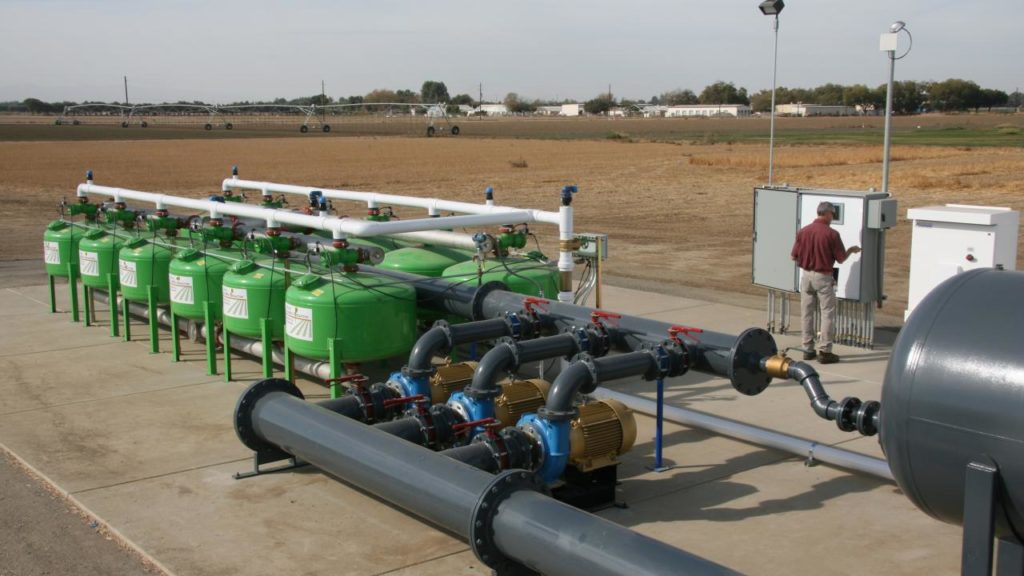

Dec 12, 2018UC Davis builds $1.5M irrigation for agricultural field research
UC Davis recently boosted its agricultural research capabilities with major irrigation infrastructure improvements on 300 acres just west of Highway 113. The upgrades include five miles of new underground PVC piping, a pumping and filtering station and state-of-the-art control technology.
The project, which became operational in October, took about a year to complete and involved dozens of personnel in a collaborative effort between the College of Agricultural and Environmental Sciences, Facilities Management, and Campus Planning & Environmental Stewardship. Three CA&ES departments use the area for field research: plant sciences; biological and agricultural engineering; and land, air and water resources.
“The old system was outdated and maintenance-intensive, concrete pipes were crumbling, and we couldn’t get water pressure up or even deliver water everywhere it was needed,” said Israel Herrera, who manages facilities at the college’s Russell Ranch and oversaw field work on the irrigation improvement project. “With the increasing adaptation of drip irrigation for more efficient use of water, we had to upgrade the whole system.”
“This is a new concept for the campus ag water system—more like a municipal model,” said Lew Pollock, an associate director with the utilities division of Facilities Management. “We did everything in house. The college paid for all the piping, and the Russell Ranch team installed the new piping. We designed, built and installed the booster pump station, but there was help on both sides. The Russell Ranch crew also did much of the rebar and concrete work.”
Utilities staff will maintain the water supply that travels from the Putah South Canal up to and through the pumping and filtering station. The college will maintain the piping system out to the various field research sites. An advantage of this large-scale approach is efficiency, saving money by its economy of scale. The combined cost of the project was about $1.5 million.
The new system has the capacity to provide 3,000 gallons of water a minute at 50 psi pressure—a significant and necessary improvement. “We need that high volume because we’re serving 300 acres out here,” Pollock said. “That’s a high water demand.”
The upgrades will greatly improve crop production, plant breeding and irrigation research at UC Davis. “This infrastructure investment will allow our scientists and students to conduct their research using the most modern irrigation systems,” said Brad Hanson, a Department of Plant Sciences specialist who also co-chaired an oversight committee on irrigation. “We’ll be able to investigate the complex interactions among crops, cultivars and production practices under different irrigation techniques in the same field and explore innovative methods of irrigating California crops.”
The system will be monitored 24 hours a day and can be accessed remotely by smart phones, tablets or computers. If something goes wrong—say, a pipe bursts—on-call utilities staff will be the first to know and can shut the system down until the problem can be identified and fixed.
The improvements are phase one of a broader initiative. The campus is looking at similar projects for several other sites with old concrete irrigation pipe in poor shape.
CA&ES and Facilities Management administrative support was crucial for this project to move forward. “Dean Helene Dillard saw a unique opportunity present itself as we reviewed our replacement program for aging irrigation wells,” said CA&ES Executive Assistant Dean Penelope Herbert. “Rather than replace outdated infrastructure, we partnered with Facilities and with Campus Planning to strategically create state-of-the-art subsurface irrigation to help position our scientists for grants and also to support the broader campus sustainability goals for water management.”














